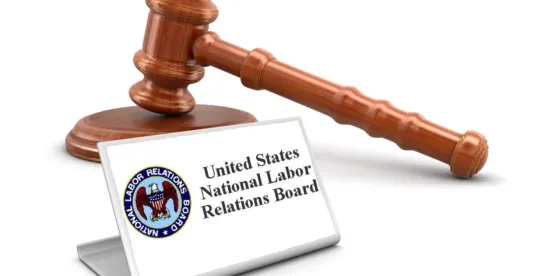Takeaways
- Rhode Island became the 13th state banning mandatory “captive audience meetings.”
- Oregon and Washinton will offer unemployment benefits to qualified striking workers starting 01.01.26.
- New York and other states are seeking to regulate private labor disputes while the Board lacks a quorum, raising federal preemption concerns.
The National Labor Relations Board remains without a quorum, leaving key decisions and enforcement actions on hold. In the meantime, state legislatures across the country have introduced new labor laws that increase employer obligations — often in areas traditionally under federal oversight. These measures include bans on mandatory captive audience meetings, expanded unemployment benefits for striking workers, and broader jurisdiction for state labor boards.
Mandatory Captive Audience Meetings
Rhode Island became the latest state to ban mandatory “captive audience” meetings. Under the new law, employers cannot discharge, discipline, or otherwise penalize employees for refusal to attend employer-sponsored meetings regarding labor organizations or listen to related communications. Rhode Island joins 12 other states that have similar legislation, including California, Connecticut, Illinois, New Jersey, and New York. The law is effective immediately.
Some state laws are facing legal challenges, however. For example, two entities are seeking to enjoin Illinois’ ban, claiming the law violates employers’ freedom of speech and is preempted by the National Labor Relations Act.
Notably, the Biden-era Board issued a 2024 decision holding mandatory captive audience meetings violate the Act. Under the Board’s standard, such mandatory meetings are unlawful, unless employers meet specific “safe harbor” requirements when conducting group meetings.
Unemployment Benefits for Striking Workers
Oregon and Washington will provide unemployment benefits to qualified striking workers under certain circumstances. Both new laws take effect Jan. 1, 2026.
The Oregon law allows lawfully striking workers to receive benefits after a two-week waiting period for up to 10 weeks. Individuals must repay any benefits received if the employer provides backpay to resolve a strike. Previously, striking workers were disqualified from receiving benefits during labor disputes.
Meanwhile, Washington’s law makes qualified workers eligible for benefits 15 days to 21 days after a strike begins, depending on the day of the week it starts. Employees will be eligible for benefits the second Sunday following the first date of the strike and then subject to the one week waiting period required by state law. If a contract is reached before this point, no benefits will be paid. Striking individuals may receive benefits for up to six calendar weeks. Importantly, individuals must repay any retroactive wages received from the separating employer. Any benefits paid out from an unlawful strike must also be repaid.
Only two other states — New Jersey and New York — have similar laws in place.
State Labor Board Jurisdiction Over Private-Sector Employees
The New York state legislature passed a bill expanding state jurisdiction over private-sector employees while the Board lacks a quorum. The five-member Board has lacked a three-member quorum since January 2025, when Trump terminated former Board Member Gwynne Wilcox.
The bill allows New York’s Public Employment Relations Board (PERB) to oversee matters traditionally falling under the Board’s scope while the Board is unable to act. The bill expands PERB’s ability to act regarding employers that are covered by the Act if the Board lacks a quorum or otherwise is unable to fulfill its duties.
The bill, which is awaiting Governor Kathy Hochul’s signature, aims to provide an alternative path for private-sector employees by allowing PERB to certify elections (for bargaining units previously certified by the Board) or hear unfair labor practice charges by parties already subject to a collective bargaining agreement.
Elected officials in California (AB288) and Massachusetts (S1327/H2086) are considering similar legislation; however, these initiatives could lead to federal preemption challenges to the Board’s exclusive jurisdiction. Indeed, on Aug. 15, 2025, Board Acting General Counsel William Cowen issued a statement addressing recent state legislative efforts to regulate private-sector labor disputes due to the Board’s lack of quorum. He emphasized that such measures are likely preempted by the Act and conflict with the U.S. Constitution’s Supremacy Clause.
Cowen also noted that, despite the absence of a quorum, the Board’s work has been largely unaffected. Regional offices continue to process cases, and the acting general counsel has been delegated authority to initiate litigation that is normally exercised by the Board. Nonetheless, the Board is expected to resume full operations once a quorum is restored.
What’s Next for the Board?
President Donald Trump has nominated Scott Mayer and James Murphy to fill the Board’s two vacant seats. If the Senate confirms both nominees, the Board would have a quorum, empowered to issue decisions and address ever-growing case backlogs.
Management-side attorney Crystal Carey is also awaiting Senate confirmation. Trump nominated her as the Board’s next general counsel, the office that leads the prosecutorial arm of the Board. The Administration’s appointee to this position will give the Board opportunities to change the law and return to more employer-friendly standards.
Consequently, many of the recent state legislative initiatives likely reflect a strategic response to the anticipated shift toward a more employer-friendly Board. States like California, Illinois, and New York may be more inclined to utilize executive action, administrative rulemaking, and legislation to assume greater authority over labor relations or to fill perceived gaps in federal law. We expect to see more litigation challenging this effort on federal preemption grounds.
Employers should closely monitor state-level developments, review existing labor policies for compliance with emerging state laws, and coordinate with counsel to anticipate litigation risks and avenues to challenge state labor regulation.





 />i
/>i
